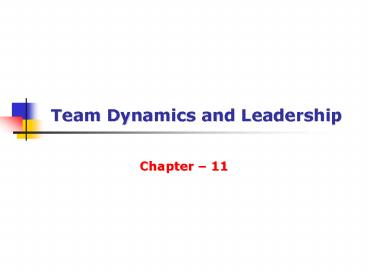Team Dynamics and Leadership - PowerPoint PPT Presentation
1 / 22
Title:
Team Dynamics and Leadership
Description:
Describe the five stages of a team's development. ... Slow down without 'shutting up' Nominal group method. Rotation method. Penny method ... – PowerPoint PPT presentation
Number of Views:144
Avg rating:3.0/5.0
Title: Team Dynamics and Leadership
1
Team Dynamics and Leadership
- Chapter 11
2
Learning Objectives
- Explain the six components of team dynamics and
how they affect team performance. - Describe the five stages of a teams development.
- Explain the four situational supervisory styles
to use with a group, based on its stage of
development. - Explain how to plan for and conduct effective
meetings. - Identify five problem members and explain how to
handle them so they do not have a negative effect
on your meetings.
3
Team Performance Model Components
- Team structure components that affect performance
as well as dynamics and development include - Type of group
- Leadership
- Composition
- Problem solving and decision making
- Conflict
4
Team Dynamics
- Team dynamics are the patterns of interactions
that emerge as groups develop. - Objectives
- Teams must agree on clear objectives.
- Size
- The ideal team size varies, depending on the
teams purpose. - Norms are the groups shared expectations of its
members behavior. - Team norms develop spontaneously as group members
interact.
5
Team Dynamics
- Cohesiveness is the attractiveness and closeness
group members have for themselves and the group.
Factors influencing cohesiveness include - Objectives
- Size
- Homogeneity
- Participation
- Competition
- Success
6
Team Dynamics
- Status within the team is the perceived ranking
or one member relative to other members of the
group. - High status confers a high degree of influence on
the group.
7
Group Roles
- Roles shared expectations of how group members
will fulfill the requirements of their position. - Task roles the things group members do and say
that directly aid in the accomplishment of its
objective (s). - Maintenance roles the things group members do
and say to develop and sustain group dynamics. - Self-interest roles the things members do and
say in order to meet their own needs/objectives
at the expense of the team.
8
Task Roles
- Objective clarifiers
- Role is to be sure everyone understands the
objective. - Planners
- Role is to determine how the objective will be
met. - Organizers
- Role is to assign and coordinate the resources.
9
Task Roles
- Leaders
- Role is to influence members through direction as
the task is performed. - Controllers
- Role is to take corrective action to ensure the
objective is achieved.
10
Maintenance Roles
- Formers
- Role is to get the members involved and committed
to the group. - Consensus seekers
- Role is to get members input and agreement on
group decisions. - Harmonizers
- Role is to help members resolve conflicts so that
they do not interfere with group performance.
11
Maintenance Roles
- Gatekeepers
- Role is to see that appropriate norms are
developed and enforced. - Encouragers
- Role is to be supportive, friendly, and
responsive to the needs of the members. - Compromisers
- Role is to modify or to get others to modify
their positions in the interest of cohesiveness.
12
Team Development Stages
- Stage 1. Orientation
- Low development level (D1)
- High commitment
- Low competence
- Anxiety
- Stage 2. Dissatisfaction
- Moderate development level (D2)
- Lower commitment
- Some competence
- Frustration
13
Team Development Stages
- Stage 3. Resolution
- High development level (D3)
- Variable commitment
- High competence
- Improved satisfaction
14
Team Development Stages
- Stage 4. Production
- Outstanding development level (D4)
- High commitment
- High competence
- Satisfaction
- Stage 5. Termination
- Same as reorganization in functional groups
- If full development has occurred, sadness is
experienced. - If team has not developed, relief is often felt.
15
Team Development Stages
16
Group Situational Supervision
- Group Development Stage (D) Supervisory
Styles/Roles (S)
17
Meeting Leadership Skills ltPlanning Meetingsgt
- Objectives
- Idea and purpose of the meeting
- Participants and assignments
- Who should attend
- Advance preparation, if any
- Agenda
- Necessary activities
- Prioritize
- Date, Time, and Place
- Optimal time of day
- Maximum length of meeting
- Logistics and technology
- Leadership
- Awareness of groups developmental stage
- Written plan
- Advance distribution to attendees of the four
items listed above
18
Meeting Leadership Skills ltConducting Meetingsgt
- The first meeting
- Must include time for introductions and
opportunity for members to interact informally - Three parts of each meeting
- Objectives
- Agenda
- Summary and review of assignments
- Leadership, Group Structure, and Emotions
- Leader has the responsibility to be aware of
group developmental levels, and to respond to
structure as well as members emotions.
19
Meeting Leadership Skills ltHandling Team Problems
Membersgt
- The Silent Member
- Encourage participation
- Nominal group method
- Rotation method
- The Talker
- Slow down without shutting up
- Nominal group method
- Rotation method
- Penny method
20
Meeting Leadership Skills ltHandling Team Problems
Membersgt
- The Wanderer
- Redirect focus of group
- Ask group pertinent question
- Lets get back to the issue at hand.
- Responsible for keeping the group on track
21
Meeting Leadership Skills ltHandling Team Problems
Membersgt
- The Bored Member
- Get involved in meeting
- Assign participatory task, such as recording
ideas on the board - Call on them
- The Arguer
- Avoid win-lose arguments
- Cut off personal arguments
- Bring others into arguments to create discussion.
- Never argue
22
Team Dynamics and Leadership
- Chapter 11
- Questions, Comments???































